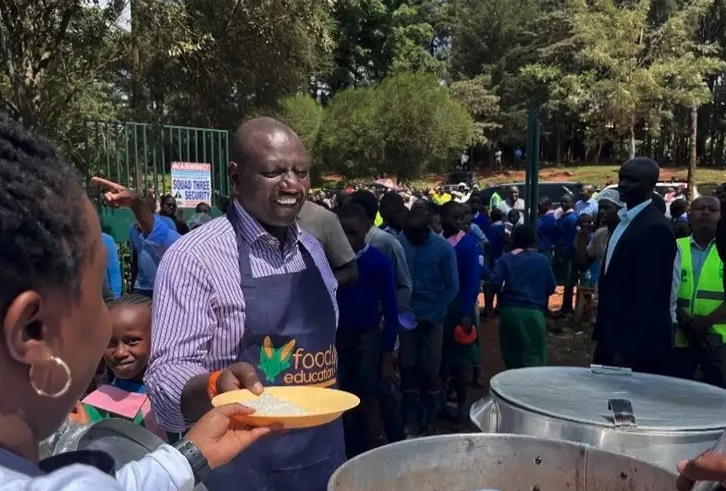As urban food insecurity worsens, school feeding provides a crucial safety net
Examining the state of school feeding
by Atula Owade | 2022-11-01

First launched in 1979, Kenya’s school feeding programmes have traditionally focused on rural and arid parts of the country. The current National School Meals and Nutrition Strategy, for example, not only continues to be targeted at public institutions, but is unable to cater for all targeted schools due to limited financing. For vulnerable urban households — such as those in Nairobi’s informal settlements — this critical safety net therefore continues to be out of reach.
A TMG Research study conducted by Strathmore University and Muungano Alliance in November 2021 investigated the state of school feeding in 112 schools across the Mukuru informal settlement of eastern Nairobi. The study found that 80% of the schools were managed by private enterprises or non-profit organizations, hence they had no access to government-run school feeding initiatives. While approximately 60% of schools had a school feeding programme in place, most parents were unable to meet the average cost of 50 Kenya Shillings (approximately 0.40 US$) per child per day. As a result, Mukuru is considered to be one of the top three food-insecure urban areas in Nairobi. While charitable donations cater for some of the most vulnerable children and high school students, a significant number of children, especially those attending schools without a feeding programme, are increasingly likely to suffer from nutritional deficiencies.
These findings show the urgent need to prioritize school feeding programmes as a critical safety net for low-income urban households. Not only does this contribute to achieving the right to food for all, but can also boost cognitive and health outcomes and reduce social inequality. In its Biennial Report on Home-Grown School Feeding (2019–2020), the African Union underscores the contribution of school-based food programmes to inclusive quality education as well as other key sectors of nutrition, health, agriculture and local development.
Can a new administration turn the tide?
Under Kenya’s devolved administrative structure, county governments are responsible for early childhood education, while the national government manages primary and secondary education. To prevent the most vulnerable households from falling through the gaps, there is a dire need for coordination among local and national government agencies responsible for school feeding programmes. Given that only a small fraction of educational institutions operating in Mukuru are currently under government oversight, this also requires that legislators proactively explore options for integrating existing frameworks with private sector and civil society initiatives, such as Mukuru’s Ruben Centre.
Prior to his election as Nairobi’s Governor, Johnson Sakaja unsuccessfully pushed for more inclusive school feeding legislation that would have bound the national government to provide a daily meal of at least 650g of food per child. Now with executive powers, his government has pledged to prioritize school feeding in the county’s budgeting process to scale up a pilot programme that has seen school attendance rates shoot from 60 to 100%. At the national level, President William Ruto’s campaign manifesto speaks of introducing compulsory daily lunch meals for students at all levels of education, including milk rations for all learners aged ten and below.
Implementation of these campaign pledges — and especially the promise to extend access to learners in non-public institutions — would close a critical gap in availing social protection to vulnerable communities in Mukuru and other low-income urban neighbourhoods. To realize this dream, national and county governments will need to significantly boost investment in core infrastructure, including kitchens and water distribution systems. Additionally, there is need to maximize economies of scale to significantly lower the per capita cost of school meals; a feat that the non-profit organization Food4Education has already achieved.
Home-grown school feeding, which encourages sourcing as much food as possible from local producers, plays an important role in linking food security to other sustainable development targets. TMG has piloted such a concept through a demonstration vegetable hydroponics farm at the Ruben Centre Primary School in Mukuru that provides fresh vegetables to more than 400 learners. While it is inconceivable that such urban agriculture initiatives will meet all food needs, a focus on shorter supply chains can help integrate urban food needs to production in adjacent peri-urban zones.
Edited by Wangu Mwangi
Cover image caption: President Ruto getting served a meal by Food4Education (Source: Wawira Njiru on Twitter)
This article is part of a series by TMG’s Urban Food Futures Programme which aims to contribute transformative changes for more resilient and inclusive urban food systems in African cities. The set of articles comprise our findings from scoping research done in Ouagadougou, Nairobi, and Cape Town between October 2021 and March 2022. Click here to read our latest report on measures — including school feeding programmes — which urban communities in the three locations use to cope with food crises.
 Urban Food FuturesFeb 09, 2026
Urban Food FuturesFeb 09, 2026Pushing the horizon: Urban farming and community-led innovation in Mukuru informal settlement
A small community-run greenhouse in Mukuru is offering insights into how controlled-environment agriculture can strengthen food security in urban environments under increasing pressure—and a look into the future of food systems in informal settlements.
Christian Sonntag, Emmanuel Atamba, Lumi Youm
 Land GovernanceDec 18, 2025
Land GovernanceDec 18, 2025Land tenure, women’s land rights, and resilience: Reflections from CRIC23 toward UNCCD COP17
Our experts discuss what the exchanges at CRIC23 highlighted and revealed about the role of secure and gender-equitable land tenure in the UNCCD's work ahead of the 2026 triple COP year.
Frederike Klümper, Washe Kazungu
 Urban Food FuturesDec 09, 2025
Urban Food FuturesDec 09, 2025The story of Mukuru's Urban Nutrition Hub
In Mukuru informal settlement, a safe haven for women has grown into the Urban Nutrition Hub, a multi-purpose space for nutrition education, training, and community development, demonstrating the potential of grassroots community-owned innovation..
Serah Kiragu-Wissler


